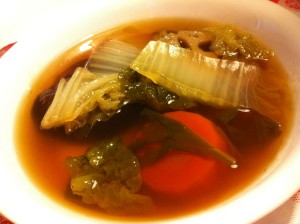 Every New Year’s, our family always eats two things: Hawaiian food and ozoni.
Every New Year’s, our family always eats two things: Hawaiian food and ozoni.
The Hawaiian food tradition started with our neighbors, a Hawaiian family, would kill and imu a pig and make a feast of foods including poi, lau lau, chicken long rice and lomi salmon. They would bring a box full of food for us on New Year’s and we’d take them a whole ham and baked beans.
Then we would eat ozoni soup, a Japanese dish flavored by dashi and contains mochi, leafy veggies, shiitake mushrooms, carrots and daikon. (We don’t put in chicken or pork, like other families.) My mom makes the same ozoni her mother made — and we’re pretty sure grandma learned this from her mom, too.
But what’s the significance for New Year’s?
“I have no idea,” my mom said.
So I did a little Google research. Turns out I can’t get a straight answer anywhere.
The best was the one I found on the Japanese Cultural Center of Hawaii’s website:
A Japanese New Year’s feast may include ozoni (a mochi soup) for strength and prosperity, otoso or ochawith umeboshi (sake or Japanese rice wine with herbs or tea with preserved plum) for good health, kazunoko (herring roe) for fertility, kuromame (black beans with chestnuts) for good health and success, kobumaki (seaweed stuffed with chicken, pork or fish tied with gourd strips) for happiness, kurikinton (mashed sweet potato and chestnuts) for good fortune, renkon (lotus root sliced crosswise) as a symbol of the wheel of life, and konbu (seaweed) for long life. It is believed that eating these special foods at the New Year will bring one good fortune during the year.
Of course, it doesn’t explain WHY ozoni is linked to strength and prosperity. The ingredients are healthy, but the dish doesn’t exemplify wealth. In fact, it uses all the foods easy to find in the harsh winter months, when fresh ingredients are likely scarce.
This made me think about all the New Year’s traditions we do — and probably don’t know why. Here are mine:
• Whatever we do on New Year’s Day is what we’ll do for the rest of the year. I hope that’s not true because I surfed the smallest waves ever. And I filled up the gas tank in the Nissan Murano and it cost me nearly $60.
• When you enter a home, the man is supposed to walk in first. If the woman does, it’s considered bad luck.
• Seeing the first sunrise of the year. I didn’t do it this year, but my girlfriend climbed Makapuu and said it was packed. You could’ve turned on music and it would’ve been a block party in downtown.
Anyone know the significance of these traditions? Or anyone got unique traditions of your own?
I’m getting to the bottom of this!



17 Comments
Cat, I don’t know either. My Mom always insisted I come home on New Year’s eve to eat soba and kinako mochi. We used to go to my cousin’s house to eat sushi and their homemade fired won tons.
For some reason ozoni didn’t strike a cord until this year when I saw a FB post from my cousin so I hoofed it over to her house to get some.
We don’t know why, we just do it.
We eat ozoni too. Supposedly for good luck and prosperity. My grandma also made us eat azuki beans for additional luck. I didn’t like the soup as a kid but I actually enjoy it as an adult (I must be aging). Happy New Year!
I don’t have any New Year’s tradition but my wife anyways makes ozoni on New Year’s day and say’s it’s for guud luck. I just go along and eat/drink the soup.
I’m Japanese too but for some reason my family never did ozoni. My grandparents made us all take a shot of warm sake at midnight though, which as a kid I thought was disgusting. To this day I still prefer cold sake.
In our family it’s always black-eyed peas, rice, collard greens and pork. On my Dad’s family was always pork and sauerkraut. All supposed to bring prosperity and good luck.
When I grew up, the traditions that stood out to me was we cleaned the house before new years including washing the windows, made sure to take a bath first thing in the morning (to be clean for new years) and also eat ozoni for good luck. You also don’t want to start the year in debt (which is hardly avoidable nowadays) and also new years is a day of rest so you don’t clean or do laundry because it will mean you will work hard all year. I found this online about some food customs:
A Traditional Japanese Custom in Hawaii
Health & Food
The Japanese people attach great importance to the New Year season. New Years is celebrated with great enthusiasm in Hawaii. There are traditional New Year’s foods that are eaten to give strength, give good luck, good health and long life. One traditional food prepared at New Year’s time is mochi.
Mochi pounding is the biggest event of the New Year’s celebration. To pound mochi, sweet rice is soaked overnight then steamed until soft. Then place the mochi in the usu (big, deep bowl). One or two people pound the mochi while another person turns the mochi in the usu between the pounds and sprinkles some water on it. When the mochi is smooth, it is placed on a table and shaped into flat balls with the hand.
Ozoni (mochi soup) is made on New Year’s eve and is eaten after midnight. It is believed to give strength throughout the upcoming year. Having a whole red fish is greatly believed to bring you good luck.
Our family New Year’s tradition is to attend a service at the Buddhist temple, and pay our respects to deceased family members. At midnight each person helps to ring the church bell and we drink a toast of warm sake. Then we dash home through a thick blanket of smoke to light strings of firecrackers, believed to scare away evil spirits.
Hey Cat: … wow, we’re almost 3 days into the New Year already!!! … I’m so looking forward and optimistic about what this year will bring … there’s always hope!!! …
… as for New Year’s traditions … I don’t think my family had one as far as food … well, except eating a lot of it … haha!!! …
… but there are a couple things I do before the New Year … thanks to my Mom …
… the first thing is cleaning my home before the New Year … the other thing I do … is just before the clock strikes midnight … I turn on all the lights in my house … and open up all the windows …
… I do it for my own reasons … and I really don’t understand the “tradition” in doing it … and I’ve never asked …
hi! the ozoni is about the round stuff in your soup. the mochi is supposed to stand for family and sticking together…that’s why it’s best to use the mochi you and your family make/pound before the new year. the other items, all round, like shitake, carrots, mizuna (the leafy green vegetable symbolizing strength)…are all supposed to represent bountiful prosperity…if you can afford to put in abalone, that goes well in the soup too.
sadly my mochi pickings are a little sparse up here in the PNW…but my gf is going to try to take on making ozoni for a get together this weekend.
hope all is well…miss you guys much…k.i.t.
m
Yeah, what is the deal with black eyed peas, spinach, and honey baked ham? Did they really have honey baked ham way back when???
Anthropologists say that the last aspect of any culture to die off is food. Kinda makes sense that Japanese Americans would hold onto these culinary traditions — even if we no longer know the significance. At least it tastes good!
do we really need a reason to drink dom and kiss strangers?…..i rest my case.
p.s. From a different view: i say unless everyone is living like Donald Trump or hit the lottery after an ozoni party, its time to make new traditions. I mean isnt that what they say is the definition of insanity…..doing the same thing over and over and expecting a different result? or something like that. So,….how about Zima and spam for the next New Year’s Eve shin-dig……and may the force be with you.
Cat. Check out this book: A Hawaii Japanese New Year With Yuki-chan by Tokie Ching. My mom said it explains a lot of the stuff we do.
https://www.amazon.com/Hawaii-Japanese-New-Year-Yuki-chan/dp/1566476410/ref=sr_1_3?s=books&ie=UTF8&qid=1325673609&sr=1-3
Hhhmmm…in my family (my mom’s side anyway) we always had Hawaiian food for Christmas and steak and king crab for New Years. I wasn’t able to make it for the holidays and I sorely miss it. At midnight as a family we all sit down and talk about the previous year, almost like saying our final goodbye and the we burn the calendar and drink sparkling cider. I always liked that tradition, except it’s kinda hard to hear each other when all the firecrackers are going off outside. I guess people just need a way to mark the occasion.
Japanese New Year’s food is very symbolic and heavily dependent on foods that sound like something auspicious. I suspect ozoni is a big deal for two reasons: it’s made from mochi, which is made from rice, which is a staple food. But also, “mochi” is the noun form of the verb “motsu,” or “to have or possess” in Japanese. By eating lots of mochi, you express the hope to have a lot in the New Year.
This emphasis on foods that sound auspicious also extends to eating sea bream or “tai,” which sounds like “medetai,” or “auspicious.” That little tangerine (“daidai”) that sits on top of two big slabs of mochi sounds like “generation to generation” and expresses the hope that your family line will continue. Herring roe (“kazu no ko”) also sounds like “number of children,” also expressing the hope that you will have lots of kids. “Mame” (beans) sound like the word for “health.” “Kombu” (kelp) sounds like “yorokobu,” or happiness.
Dude…the mochi soup is to cure that banging in your head from drinking so much on new year’s eve the night before. We would eat hot soba after midnight to ease the stomach also to satisfy the hunger from popping all that firecracker. My mom would always make us eat the kuromame bean (at least one). And the mochi stack with the tangerine with leaves and the bamboo with pine at the front door. All for good luck my mom would say. All I know is I like to blow stuff up with the firecrackers to chase away the evil. We would clean the house and bathe before the new year also during small kid time but not so much anymore.
I was introduced to ozoni late in life because I wouldn’t touch it as a kid. But I almost choked on the ozoni at a New Years eve dinner, so that was my last experience with the stuff!! Heh heh